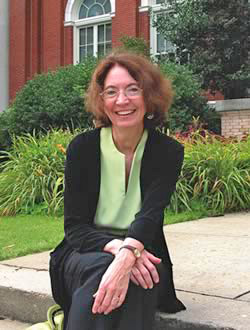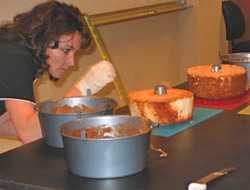Intrigued by Economics Professor’s Enthusiasm for Subject Rubs Off on Students
By: Jamie Creamer

Patricia Duffy
Patricia Duffy knew exactly what she wanted to do when she graduated from Silver Lake Regional High School in Pembroke, Mass., in 1973: She wanted to attend Boston College, which she did; she wanted to get a double major in English and French, which she did; and she wanted to join the U.S. Peace Corps, which she did.
So given all that, how did the city-raised liberal-arts major from New England wind up in agriculture, as an agricultural economist at Auburn University no less? For Duffy, the French and the Peace Corps were the connections.
“My assignment with the Peace Corps was to Zaire, and they needed someone who was fluent in French to teach agriculture to high school students,” Duffy says. “I knew little about agriculture, but I spoke French, so they recruited me for that position and sent me to ag school.”
To Michigan State University, to be exact, in that summer of ’77, for an ultra-intense training program that began each morning at 5:30 with feeding the chickens. Duffy found farming fascinating.
“Agriculture was basically a whole new area for me, and it was really exciting to learn,” Duffy says. Her favorite subjects: horticulture and field crops. “I was more interested in plants than in animals,” she says.
That crash course in agriculture ran through mid-August. Then Duffy was off to the country then known as Zaire (today the Democratic Republic of the Congo), where she spent the first two months of a two-year assignment in yet more training—this time, in tropical agriculture.
“I was pruning coffee trees and propagating banana trees—things I certainly never would have dreamed of doing or otherwise have had the opportunity to do,” Duffy says.
With all that training under her belt, she was at last ready for the classroom, where she taught French-speaking African teens both vocational agriculture and math.
For a young woman fresh out of college, that first teaching experience was challenging and rewarding.
“There were no textbooks, there were no copy machines, and it was long before the days of Power Point, so what I wrote on the blackboard was all the students had to study,” she recalls. “But the students were very smart and worked really hard, and everyone there treated high school teachers with tremendous respect. It was a great experience.”
During Duffy’s time in Zaire, the country’s dire economy sparked in her a keen interest in economics.
“I became intrigued by it,” she says. “The field is so interesting, because it’s all about people, and how they make choices, and the impacts those choices have on their lives and beyond.”
As she began to think about her future post–Peace Corps, Duffy seriously considered pursuing a career in horticulture, but her newfound interests in both agriculture and economics won out. When her stint with the Corps ended, Duffy came back to the states and began to apply to graduate schools with programs in agricultural economics.
“Remember, my undergraduate degrees were in English and French, so not all of the 12 schools I applied to were exactly jumping up and down to accept me into their ag econ programs,” she says.
She was accepted to two, Michigan State and Texas A&M, but personal letters from several A&M faculty members—including one who, like Duffy, had switched from a totally unrelated field to ag econ after having served in the Peace Corps—led her to choose the Texas land-grant university for her master’s work
Shortly after entering the program, however, Duffy submitted an uncommon request to the department.
“I asked if I could skip my master’s and go straight for my Ph.D.,” she says.
Permission was granted. In 1985, after having taken a year off to work as a budget aide for U.S. Sen. Phil Gramm (R-Texas) in Washington, D.C., she earned her doctorate, writing her dissertation on federal farm programs and their effects on international trade.
One of the folks she met in the ag econ department at Texas A&M was Extension agricultural economist Jim Novak, whom she wound up marrying. Once she earned her Ph.D., they came to Auburn.
“We needed two jobs, and the department here had two openings,” she says.
Duffy says her decision to keep her maiden name professionally was a practical one:
“At the time, there was only one phone into the department, and we didn’t want the confusion of people calling in and asking for Dr. Novak.”
At Auburn, Duffy splits her time 50/50 between research and teaching.
Her research interests lie in two areas: basic farm management, budgeting and decision-making on the one hand and food assistance for low-income families, with a special focus on food pantries, on the other.
On the academic side, Duffy teaches an undergraduate microeconomics course and various graduate-level courses, including farm management.
“I enjoy the research aspect of my work, especially writing papers, but I like the students a whole lot, too,” she says.
And the feeling is mutual, with students consistently giving Duffy high marks for her thorough knowledge of her subject and her prowess in making what could be a dry, boring course interesting and applicable.
A high-energy woman, Duffy doesn’t allow herself much down time. The five-mile-a-day runner and mother of one serves as secretary of the AU Faculty Senate, volunteers with the Lee County Red Cross and Department of Human Resources and is a writer, penning science-fiction short stories.
In fact, in a flashback to where she began back in 1973, Duffy in 1996 added to her credentials when she earned a master’s degree, in English, from Auburn.
“It was just something I wanted to do, for my creative side,” she says. “For me, writing is a right-brain activity that sort of counters all the left-brain activity that comes with being an economist.”
Measuring Up

Shelley McKee
Shelley McKee, AU poultry science professor, measures height differences among angel food cakes made with fresh, stored, spray-dried and yolk-contaminated egg whites during the National Egg Products School held in Auburn in November. The school, sponsored by the American Egg Board, is an annual four-day hands-on introduction to egg processing. The program covered the formation of the egg through packaging of the final egg product. Personnel from the egg processing, food service and allied industries attended.
